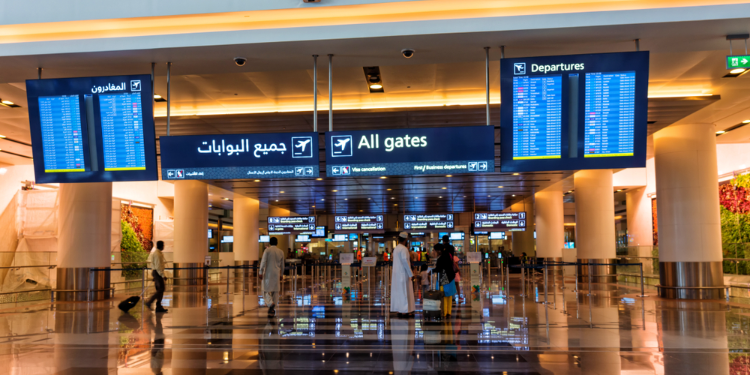
In late October, the Sultanate of Oman issued a circular to announce that all legal residents of other Gulf Cooperation Council (GCC) countries can now receive a visa on arrival in Oman. This move will help boost tourism and trade in the Sultanate.
Freedom of movement within the GCC is not equal for citizens and expats
The Gulf Cooperation Council, or GCC, is an economic and political union between six Gulf states: Bahrain, Kuwait, Omar, Qatar, Saudi Arabia and the United Arab Emirates (UAE/Dubai). It was created in 1981.
Among other things, citizens of these six countries have enjoyed the freedom of movement within the region since 2001. This is not too different from freedom of movement within the European Union. They only need to present their ID at the border. They can also reside and work in any member state with barely any restrictions.
However, here's the strange thing: expats form a very large segment of the populations of all GCC countries. Their demographic weight ranges from around 30% in Saudi Arabia to nearly 90% in the UAE. This creates a rather odd situation where only a minority of all GCC residents, that is, citizens, actually enjoy the freedom of movement in the region. The numerical majority, expats, cannot benefit from it.
Expats in the GCC hence often need to apply, wait and pay for a visa just for a short business or tourist trip in a neighboring country, one that might be a mere hour-long flight or six-hour drive away. Depending on their nationality, some may be entitled to a visa on arrival, but others will actually have to go through a full visa application process. For example, Indians in the Gulf region, with an expat population of some 8.5 million people, need to apply for a traditional visa to enter the UAE. They can only obtain a visa on arrival if they have an American or European residence permit or visit visa.
Another limitation on the freedom of movement of expats is that they cannot hold residence permits in two GCC countries at the same time. Accessing the same privileges enjoyed by citizens is also rendered quasi-impossible by the fact that expats rarely become naturalized in Gulf countries. For instance, an expat needs to have been living continuously in Qatar for 25 years before they can apply for citizenship. This is much longer than the 5-10 years that's the norm in most countries around the world.
Oman extends freedom of movement to all GCC expats
In September 2022, the Sultanate of Oman decided to make things easier for the 19 million expats in the five other GCC countries. As the Muscat Daily reports, Oman's Directorate General of Passport & Residence released a circular saying that all expats who have a valid work and/or residence permit in Saudi Arabia, Bahrain, Qatar, the UAE and Kuwait can now receive a visa on arrival in Oman. Previously, they had to apply for an e-visa in advance.
For a GCC expat's work or residence permit to be accepted, it needs to be valid for at least 3 months from the time they enter Oman as a visitor. No specific information was provided in the circular concerning the maximum length of stay, but it is likely to be 3 months, too – like for the regular multiple-entry visit visa. It will not be free: it will need to be paid for on arrival at Muscat International Airport.
Most interestingly, there is no professional or income requirement. This means that domestic helpers and business executives now enjoy the same right to enter Oman. Another flexible aspect of this amendment is that the expat doesn't necessarily need to be flying directly from another GCC country. As long as they still have a valid work/residence permit, they can fly in from anywhere around the world. An Indian expat with a work permit in Saudi Arabia could fly into Oman from Jeddah, Delhi, Durban, or Kyoto – it doesn't matter.
This move is intended to boost tourism and tourism in Oman. The country's economy has started growing again after the pandemic and the drop in the price of oil. The World Bank predicts that the Omani economy will grow by 4.5% in 2022. Its economy has also reaped the rewards of the FIFA World Cup in the neighboring country of Qatar. Indeed, the Omani Sultanate has created a special free, multi-entry 60-day visa for tourists with World Cup tickets. It is also hosting a Football Fan Festival with match broadcasts, food stalls, interactive games and competitions, and live performances. This festival is being held in a stadium that's only 10 minutes from Muscat International Airport, an airport that has multiple daily shuttle flights from and to Qatar during the FIFA season.
The football hype must have contributed to the astounding 959% increase in visits to Oman in 2022, as the Muscat Daily observes. The data from the National Centre for Statistics and Information shows that many of these visitors, especially before the football hype really started around August, were from other GCC countries. Out of the 1 million GCC residents who visited Oman in the January-July period, 200,000 were Indian expats, 74,000 Yemeni expats, 47,000 Pakistani expats and 33,000 British expats. Oman clearly wants to tap into that trend and encourage more GCC residents to visit their country or do business in it. To do that, it's removing a big travel barrier – visa applications.



















